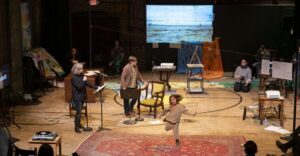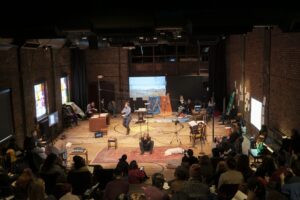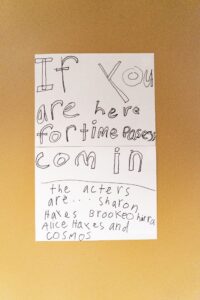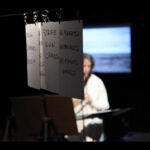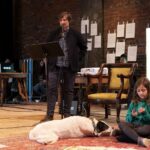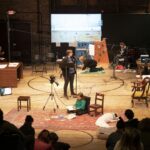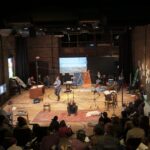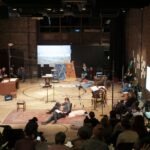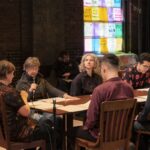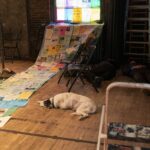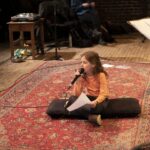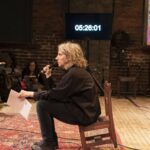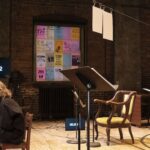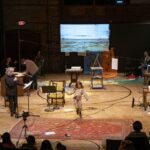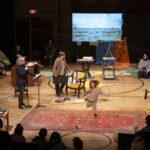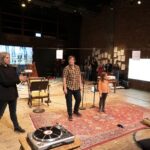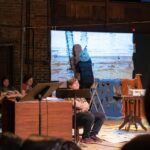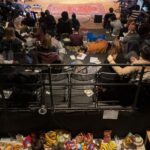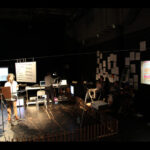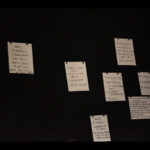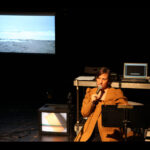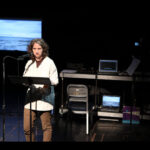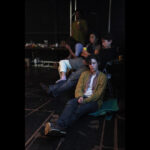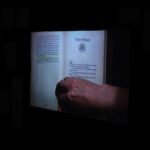Virginia Woolf was forty-four when she wrote the novel To the Lighthouse in 1926, eight years after the end of World War I. We gravitated toward this novel in 2011. While we were approaching Woolf’s age ourselves, we also were about to have a kid. We performed this piece for the first time, May 2011, when Brooke was eight months pregnant with Alice.
That reality placed us inside a perplexing set of reflections that moved constantly backwards and forwards. Reflections encompassing a whole field of desires, actions, and emotions: some fulfilled, some discarded and some never realized.
This first workshop showing of Time Passes attempted to sketch out, in the broadest of strokes, the beginnings of our interest in this work.
This second performance digs deeper but, in embarking on the piece again, it has become very clear to us that this work will always be in process. We’ve begun to articulate a form or structure of deep and sustained listening in which we’re interested in the interaction between voice, emotion, thought, desire, activity and words. There are gaps, things pointed to but not developed. We are interested in your feedback, so if you collect thoughts along the way, please make notes and e-mail us sometime in the near future.
The audio book and showing are composed of three parts:
Part I, The Window 00:00:00 to 04:43:37
Part II, Time Passes 35 minutes
Part III, The Lighthouse 05:23:54 to 07:56:10
A note on duration:
Preparing for this performance is like training for a marathon, you don’t run the distance until the actual day. We have had only one previous experience of the full 8 hours of sustained listening/watching/absorbing. Today’s event remains quite new for us as well as, we imagine, for you. Obviously, our experience of performer time will be quite different from yours of audience time.
We encourage you to do whatever you’d like to do to be present to the duration. You can move around the room, you can walk continuously for various lengths of time, you can sleep, lay down, knit, draw, paint, write, read along (there are many copies of the book available for that), eat, drink, use the toilet, etc. In the interest of the experiment with time, some activities that feel out of place are computer and cell-phone use, text messaging, and e-mailing. We’d like to ask you, out of respect for others around you, to refrain from using an electronic device in the theater. If you have an emergency or must check your phone or computer, we understand and please step out into the lobby to do so.
There are chairs throughout the space, on the floor and on the risers. You are welcome and encouraged to sit in any of them and also to move around and swap seats with each other as you feel like it. We’ve also tried to leave some room for you to lay down or sprawl out on the floor or risers.
There are bathrooms downstairs on the first floor and bathrooms behind the performing space in the dressing room. You are encouraged to use whichever ones you feel like using. Please feel free to walk through the back of the space to use the dressing room bathrooms. If you do, you’ll notice the doors are a little funky but they will close if you muscle them a bit.
There are only specific times when we, Brooke, Sharon and Alice, can take bathroom breaks and eating breaks, so if one of us is headed to the toilet and you can allow us to go first, that would be great.
If you happen to be eating on the floor or have your plate near floor, be careful of the white dog. She loves eating off stray plates. This distracts her from her performance responsibilities, so please keep all food out of reach of her.
Fresh coffee was delivered at 11:30 am and will be delivered again at 2 pm and 4:30 pm. Feel free to make yourself tea. There is a kettle and teas at the food tables.
This performance of Time Passes is supported by a grant from the Velocity Fund administered by Temple Contemporary with generous funding from the Andy Warhol Foundation for Visual Arts. Additional support comes from the Pew Fellowship program.
Flyers are drawn from a piece called Join Us, organized by Sharon Hayes with Angela Beallor, with flyers lent by Marc Beallor; Nastalie Bogira; Louis Cisneroz; deb ~:; June Diebold; Kristin Dooley; Joy Episalla and Carrie Yamaoka; Mike Flugennock, School of the Americas Watch; Imani Henry; Kate Huh; Nik Krempasky; Brooke O’Harra; Sam Tylicki; Beth Vild; Visual Aids; Occupy the Hood, Detroit; Gay, Lesbian, Bisexual, Transgender Historical Society; Provin Collection, Bancroft Library (Banc MSS 2011/128); University of Washington Library, Special Collections; Labadie Collection, University of Michigan; UCLA Charles E. Young Research Library Department of Special Collections, Los Angeles Times Photographic Archive, Copyright the Regents of the University of California, UCLA Library; Tamiment Archives; Hoover Institution Library and Archives, Stanford University; May 4 Collection, Kent State University Libraries Special Collections and Archives; The National Archive of Lesbian, Gay, Bisexual, & Transgender History; The Lesbian, Gay, Bisexual & Transgender Community Center; Lesbian Herstory Archives; Downtown Collection, Fales Library, NYU; Minnesota Historical Society; Smith College Archives and Sofia Smith Archive.
- Photo by Frances Beaver
- Photo by Frances Beaver
- Photo by Frances Beaver
- Photo by Frances Beaver
- Photo by Frances Beaver
- Photo by Frances Beaver
- Photo by Frances Beaver
- Photo by Frances Beaver
- Photo by Frances Beaver
- Photo by Frances Beaver
- Photo by Frances Beaver
- Photo by Frances Beaver
- Photo by Frances Beaver
- Photo by Frances Beaver
